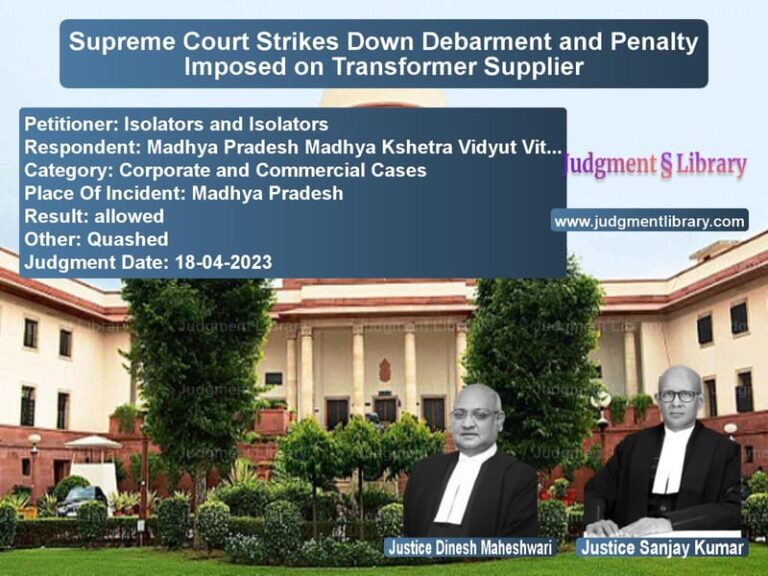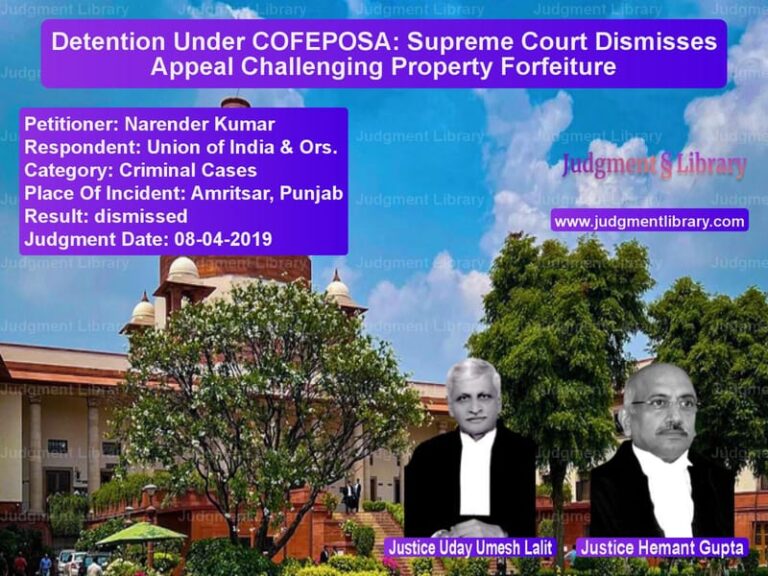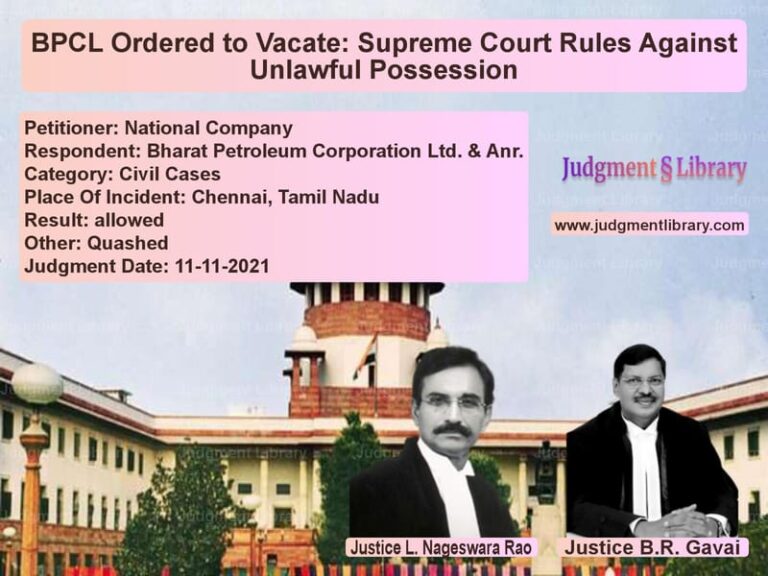Supreme Court Rules on Pension Benefits for Retired High Court Judge
The Supreme Court of India has ruled in favor of Justice (Retd) Raj Rahul Garg (Raj Rani Jain), directing the Union of India to compute her pensionary benefits by including the period she served as a Judge of the Punjab and Haryana High Court. The case, Union of India, Ministry of Law & Justice vs. Justice (Retd) Raj Rahul Garg, addressed a dispute over whether a break in service before her appointment as a High Court Judge could affect her pension calculations.
The Supreme Court upheld the Punjab and Haryana High Court’s decision that her service as a Judge of the High Court must be blended with her service as a District Judge, ensuring she receives pensionary benefits as a High Court Judge.
Background of the Case
Justice (Retd) Raj Rahul Garg was appointed as a Judicial Magistrate in Haryana on May 11, 1981. Over the years, she was promoted to Additional District Judge on August 26, 1997, and then as District Judge on July 19, 2010. She retired as a District Judge on July 31, 2014, before being appointed as a Judge of the Punjab and Haryana High Court on September 25, 2014. She served as a High Court Judge until her retirement on July 4, 2016.
Following her retirement, she sought pensionary benefits, arguing that her entire service, from May 11, 1981, to July 31, 2014, and from September 25, 2014, to July 4, 2016, should be considered for pension calculation. However, the Union of India contested this claim, asserting that the break in service between her retirement as a District Judge and appointment as a High Court Judge disqualified her from pension benefits as a High Court Judge.
Legal Dispute and High Court Ruling
1. Petition Before the Punjab and Haryana High Court
- Justice (Retd) Raj Rahul Garg filed a petition under Article 226 of the Constitution, challenging the denial of pensionary benefits.
- The Union of India argued that the gap in service should be treated as a break, disqualifying her from receiving pension benefits as a High Court Judge.
- The Punjab and Haryana High Court ruled in her favor, holding that her service as a High Court Judge must be blended with her service in the District Judiciary for pension purposes.
2. Appeal by the Union of India
- The Union of India challenged the High Court’s decision, arguing that pension should be calculated based on her last drawn salary as a District Judge.
- The government maintained that the break in service was not condonable under the High Court Judges (Salaries and Conditions of Service) Act, 1954.
Supreme Court’s Key Observations
1. Pension Benefits Must Consider Judicial Service as a Whole
“The entire period of service rendered by the respondent from May 11, 1981, till July 31, 2014, as well as service from September 25, 2014, to July 4, 2016, must be considered for computing pensionary benefits.”
2. No Justification for Excluding High Court Service
- The Supreme Court emphasized that her tenure as a High Court Judge was a continuation of her judicial career.
- It held that excluding her service as a High Court Judge from pension calculations would be discriminatory.
“To conclude, it is manifestly clear that what is to be blended is the ‘actual service’ rendered as a Judge of the High Court to the service rendered by the petitioner from 1981 till July 31, 2014.”
3. Precedents on Pension Benefits for High Court Judges
- The Court cited Kuldip Singh vs. Union of India (2002) and P. Ramakrishnam Raju vs. Union of India (2014) to support its decision.
- It reaffirmed that judicial officers promoted to the High Court should not be treated differently from members of the Bar appointed as High Court Judges.
“The fixation of higher pension for Judges drawn from the subordinate judiciary and lower pension for Judges from the Bar is discriminatory and breaches Article 14 of the Constitution.”
Final Verdict
The Supreme Court dismissed the appeal and ruled:
“The pensionary payments shall be computed on the basis of the last drawn salary as a Judge of the High Court. The arrears of pension shall be payable to the first respondent on or before March 31, 2024, together with interest at the rate of 6% per annum.”
Conclusion
The Supreme Court’s ruling upholds key principles of judicial pension benefits:
- Service continuity matters – Breaks due to administrative delays should not penalize judges.
- Fair treatment for all High Court Judges – Members of the District Judiciary must receive equitable pension benefits.
- Judicial independence and dignity – Pension ensures financial security for retired judges, reinforcing judicial independence.
This judgment reinforces the judiciary’s commitment to fair pension policies and ensures equitable treatment of High Court Judges appointed from different career backgrounds.
Petitioner Name: Union of India, Ministry of Law & Justice.Respondent Name: Justice (Retd) Raj Rahul Garg.Judgment By: Justice Dhananjaya Y Chandrachud, Justice J B Pardiwala, Justice Manoj Misra.Place Of Incident: Punjab and Haryana.Judgment Date: 15-03-2024.
Don’t miss out on the full details! Download the complete judgment in PDF format below and gain valuable insights instantly!
Download Judgment: union-of-india,-mini-vs-justice-(retd)-raj-r-supreme-court-of-india-judgment-dated-15-03-2024.pdf
Directly Download Judgment: Directly download this Judgment
See all petitions in Pension and Gratuity
See all petitions in Public Sector Employees
See all petitions in Judgment by Dhananjaya Y Chandrachud
See all petitions in Judgment by J.B. Pardiwala
See all petitions in Judgment by Manoj Misra
See all petitions in dismissed
See all petitions in supreme court of India judgments March 2024
See all petitions in 2024 judgments
See all posts in Service Matters Category
See all allowed petitions in Service Matters Category
See all Dismissed petitions in Service Matters Category
See all partially allowed petitions in Service Matters Category







